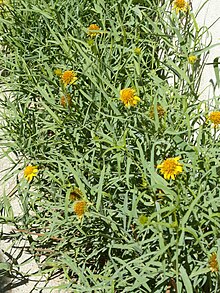Pascalia is genus of flowering plants belonging to the family Asteraceae.[1]
| Pascalia | |
|---|---|

| |
| Pascalia glauca | |
| Scientific classification | |
| Kingdom: | Plantae |
| Clade: | Tracheophytes |
| Clade: | Angiosperms |
| Clade: | Eudicots |
| Clade: | Asterids |
| Order: | Asterales |
| Family: | Asteraceae |
| Subtribe: | Ecliptinae |
| Genus: | Pascalia Ortega |
| Type species | |
| Pascalia glauca Ortega
| |
| Synonyms | |
|
Lorentzia Griseb. | |
It is native to South America, and found in (north-eastern, north-western and southern) Argentina, Bolivia, Chile, Paraguay and Uruguay.[1] It has been introduced the following regions, Alabama, Florida, Georgia, (in USA), the Northern Provinces (South Africa), Palestine, Portugal, Spain, South Australia, New South Wales and Victoria (in Australia).[1]
The genus name of Pascalia is in honour of Diego Baldassare Pascal (1768–1812), a French-born Italian doctor and botanist. He was also professor of botany in Parma and botanical garden director.[2] It was first described and published in Nov. Rar. Pl. Descr. Dec. on page 39 in 1797.[1]
Known species
editAccording to Kew;[1]
- Pascalia glauca Ortega
- Pascalia subvaginata (N.E.Br.) Strother
References
edit- ^ a b c d e "Pascalia Ortega | Plants of the World Online | Kew Science". Plants of the World Online. Retrieved 8 November 2021.
- ^ Burkhardt, Lotte (2018). Verzeichnis eponymischer Pflanzennamen – Erweiterte Edition [Index of Eponymic Plant Names – Extended Edition] (pdf) (in German). Berlin: Botanic Garden and Botanical Museum, Freie Universität Berlin. doi:10.3372/epolist2018. ISBN 978-3-946292-26-5. Retrieved 1 January 2021.
Data related to Pascalia at Wikispecies